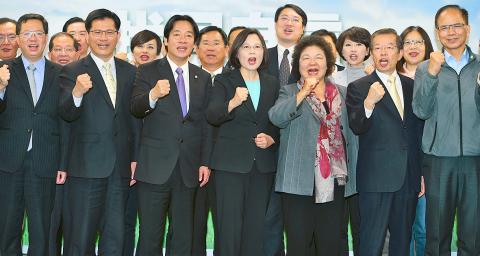Democratic Progressive Party (DPP) Chairperson Tsai Ing-wen (蔡英文) formally declared her candidacy for next year’s presidential race yesterday after receiving her party’s nomination, calling for solidarity and strength to change the nation.
“Today is an important day and I am honored to accept the DPP’s nomination to take part in the Republic of China’s next presidential election on behalf of the DPP,” Tsai, 58, told a press conference at DPP headquarters in Taipei.
Tsai’s nomination was approved at a meeting of the party’s Central Executive Committee to a round of applause shortly before the press conference.

Photo: Liao Chen-huei, Taipei Times
It will be Tsai’s second shot at the presidency, after losing to President Ma Ying-jeou (馬英九) of the Chinese Nationalist Party (KMT) in the 2012 presidential election, in which Tsai garnered 45.63 percent of the votes, while Ma received 51.6 percent.
“The night we were beaten, there were many young people crying,” Tsai said.
“Today, I want to tell you all — and myself — I will do whatever I can to turn those tears to laughter,” Tsai added.
Tsai said the development of cross-strait relations had to be subject to the will of Taiwanese and could not be undertaken as party-to-party negotiations.
“The basic principle of our party in cross-strait relations is to maintain the ‘status quo,’” Tsai said.
“After we [the DPP] come to power, we will examine agreements [with China] case by case, according to the law, and will continue negotiations,” she added.
Tsai also attacked the KMT over the nation’s growing wealth gap and growing youth unemployment, vowing to rehabilitate the nation’s economy.
“The government has shut the door on the public and refused to listen to them,” she said.
The KMT has yet to announce its nomination, but Tsai leads all the likely candidates in opinion polls.
As the DPP announced its candidate for next year’s presidential election, China yesterday warned the party to heed the lessons of the last time it was in power and not to push for independence.
“If [the DPP] upholds the Taiwanese independence splittist position of ‘one country on either side of the Taiwan Strait,’ then it will be hard to find a way out for cross-strait relations,” China’s Taiwan Affairs Office spokesman Ma Xiaoguang (馬曉光) told a regular press briefing in Beijing. “This is not a new talking point — this is what happened between 2000 and 2008. One need not look far for a lesson.”

CALL FOR SUPPORT: President William Lai called on lawmakers across party lines to ensure the livelihood of Taiwanese and that national security is protected President William Lai (賴清德) yesterday called for bipartisan support for Taiwan’s investment in self-defense capabilities at the christening and launch of two coast guard vessels at CSBC Corp, Taiwan’s (台灣國際造船) shipyard in Kaohsiung. The Taipei (台北) is the fourth and final ship of the Chiayi-class offshore patrol vessels, and the Siraya (西拉雅) is the Coast Guard Administration’s (CGA) first-ever ocean patrol vessel, the government said. The Taipei is the fourth and final ship of the Chiayi-class offshore patrol vessels with a displacement of about 4,000 tonnes, Lai said. This ship class was ordered as a result of former president Tsai Ing-wen’s (蔡英文) 2018

UKRAINE, NVIDIA: The US leader said the subject of Russia’s war had come up ‘very strongly,’ while Jenson Huang was hoping that the conversation was good Chinese President Xi Jinping (習近平) and US President Donald Trump had differing takes following their meeting in Busan, South Korea, yesterday. Xi said that the two sides should complete follow-up work as soon as possible to deliver tangible results that would provide “peace of mind” to China, the US and the rest of the world, while Trump hailed the “great success” of the talks. The two discussed trade, including a deal to reduce tariffs slapped on China for its role in the fentanyl trade, as well as cooperation in ending the war in Ukraine, among other issues, but they did not mention

HOTEL HIRING: An official said that hoteliers could begin hiring migrant workers next year, but must adhere to a rule requiring a NT$2,000 salary hike for Taiwanese The government is to allow the hospitality industry to recruit mid-level migrant workers for housekeeping and three other lines of work after the Executive Yuan yesterday approved a proposal by the Ministry of Labor. A shortage of workers at hotels and accommodation facilities was discussed at a meeting of the legislature’s Transportation Committee. A 2023 survey conducted by the Tourism Administration found that Taiwan’s lodging industry was short of about 6,600 housekeeping and cleaning workers, the agency said in a report to the committee. The shortage of workers in the industry is being studied, the report said. Hotel and Lodging Division Deputy Director Cheng

‘SECRETS’: While saying China would not attack during his presidency, Donald Trump declined to say how Washington would respond if Beijing were to take military action US President Donald Trump said that China would not take military action against Taiwan while he is president, as the Chinese leaders “know the consequences.” Trump made the statement during an interview on CBS’ 60 Minutes program that aired on Sunday, a few days after his meeting with Chinese President Xi Jinping (習近平) in South Korea. “He [Xi] has openly said, and his people have openly said at meetings, ‘we would never do anything while President Trump is president,’ because they know the consequences,” Trump said in the interview. However, he repeatedly declined to say exactly how Washington would respond in